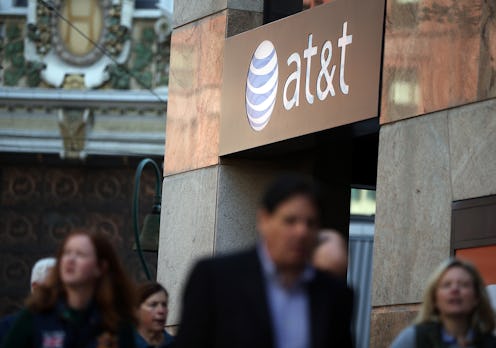News
Another Day, Another Huge Corporate Merger
In yet another big, recent corporate merger, AT&T agreed to buy DirecTV for $48.5 billion Sunday, a move placing them in prime position to become a colossal all-in-one phone, Internet, and television provider. The news was hailed by AT&T CEO Randall Stephenson as a chance to "redefine the video entertainment industry," but it's stirred a fair share of criticism as well — hot on the heels of Comcast's complete takeover of NBC Universal last year, many advocates have warned that this new conglomeration could hurt consumers. So, what should a DirecTV or AT&T customer expect?
One of the major concerns, which is often a concern when industry titans merge, is whether the new concentration of power and loss of competition will allow the resulting company to more easily fleece their consumers. Simply put, if you're the only game in town, selling your wares becomes a lot easier.
Minnesota Senator Al Franken raised this point, as a former writer, actor, and comedian on NBC's Saturday Night Live who has a unique, intimate proximity to issues in the entertainment industry. Franken warned about the perils of consolidation of power between Comcast and NBC late last year, as well as their plan to acquire Time Warner Cable. And now that AT&T and DirecTV are following suit, he's raising the alarms again. As he told CNN:
This is going exactly in the wrong direction. The fewer players there are in this space, I believe it’s worse for consumers. My constituents in Minnesota will be paying more for cable ... They’re just buying each other. This is a bad trend.
Is Franken right? Just how much should DirecTV or AT&T users have to fear from today's news? Ultimately, how it ends up impacting your experience as a consumer likely depends on what you want out of your telecom/entertainment services. What AT&T's Stephenson specifically cited as a boon in all this — that the new merged company would be able to "offer new bundles and deliver content to consumers across multiple screens" — is likely true. It's not hard to imagine that combining the telecom and satellite TV sides of the companies will open up new offers and promotions which might not otherwise have been available all-in-one.
But Franken's core argument is a highly compelling one. Combining two competitors into one can lessen the imperative to innovate and outperform, and with the seismic shifts that have been happening in such industries in recent years, what we think of as market competition is increasingly being stripped down to fewer and fewer choices. Fearing intervention from federal regulators, the two companies have made a number of claims about how they'll run their business post-merger, including:
- DirecTV maintaining its currently priced standalone services, for any consumer who prefers them, for three years following the merge.
- AT&T similarly promising a consistent minimum speed — at least six megabits per second — for Internet-only consumers who don't want to change their plan, also to last for three years.
- AT&T launching an ambitious broadband expansion, into rural parts of the United States bereft of high-speed connections. They peg the figure at 15 million homes connected, through either the use of fiber optic cables or direct radio links.
- This is the big one — they're claiming they'll abide by the Net Neutrality rules which existed in 2010, before being thrown out in a court ruling against the FCC earlier this year. That would mean they couldn't discriminate regarding connection speed based on the content you're viewing, or what provider it comes from. Net neutrality proponents fear, in absence of the those rules, that connectivity could become a multi-tiered affair.
Given the amount of money this took, AT&T's ambition in this area seems pretty clear. They bought out DirecTV at $95 per share, but also cleared the TV provider's outstanding debts, which bumped the already eye-popping price tag even higher — all told, it ran AT&T $67.1 billion.
